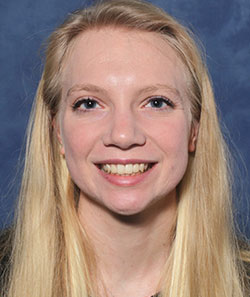Mackenzie Mills Wins Kuiper Award

Mackenzie Mills is the 2025 recipient of the Gerard P. Kuiper Memorial Award, which recognizes excellence in academics and research. She defended her dissertation, Evolutionary Landscapes and Resurfacing Processes of Planetary Surfaces in Fall 2024. Her advisor was Regents Professor Alfred McEwen. She is currently a Physical Scientist working at the U.S.G.S. Washington Water Science Center in Tacoma, Washington.
Despite spending her first LPL year entirely remote due to COVID and having to relinquish a Fulbright Scholar project, Mackenzie completed her degree in just over four years. While at LPL, she won a NASA FINESST grant and two Galileo Circle awards and made substantial contributions to research about Mars and icy moons, pursing a broad range of techniques, including analysis of remote sensing data, modeling, and field work.
In her student career as a graduate student, Mackenzie made important contributions to research, teaching, and innovation. She collaborated successfully with multiple scientists at JPL, U of A, U.S.G.S., and the University of Bern. She demonstrated her leadership skills as President of the Alpha Kappa Chapter of Sigma Gamma Epsilon. Mackenzie also tutored students and mentored secondary school students in Baltimore and Tucson and has mentored visually-impaired middle and high school students through the U of A initiative, Project POEM. Also while a student, she participated in science outreach by giving talks to local astronomy groups.
Mackenzie published four first-author papers while a graduate student at LPL. In the first, she mapped a region around the Tianwen-1 landing site and Zhurong rover in Utopia Planitia, Mars. The mapping established extensive resurfacing by flows, most likely of igneous or sedimentary (mud flow) origin. Mackenzie presented results at the Lunar and Planetary Science Conference in 2023. The study of rift zones and resurfacing on Mars was an outgrowth of a summer internship at the NASA Jet Propulsion Laboratory. The second paper topic also grew from her JPL research about moonquake-induced mass wasting of icy satellites and resulted in a NASA press release. The paper’s hypothesis that seismically-induced mass wasting creates smooth (at the 100-m scale) plains will be tested by high-resolution (to 0.5 m/pixel) images and topography from Europa Clipper. For her third paper, Mackenzie manually mapped the distribution of pitted cones in Utopia Planitia (Mars). And in a fourth paper, Mackenzie used machine learning to map pitted cones over all of Mars, creating global maps of pitted cones and indicating that >90% are over the Vastitas Borealis formation. Results support the case for lowland pitted cones as mud (not magmatic) volcanoes.
The Gerard P. Kuiper Memorial Award is presented to students who best exemplify, through the high quality of their research and the excellence of their scholastic achievements, the goals and standards established and maintained by Gerard P. Kuiper, founder of the Lunar and Planetary Laboratory and the Department of Planetary Sciences at the University of Arizona. To support students with the Kuiper Award, visit the University of Arizona Foundation.

